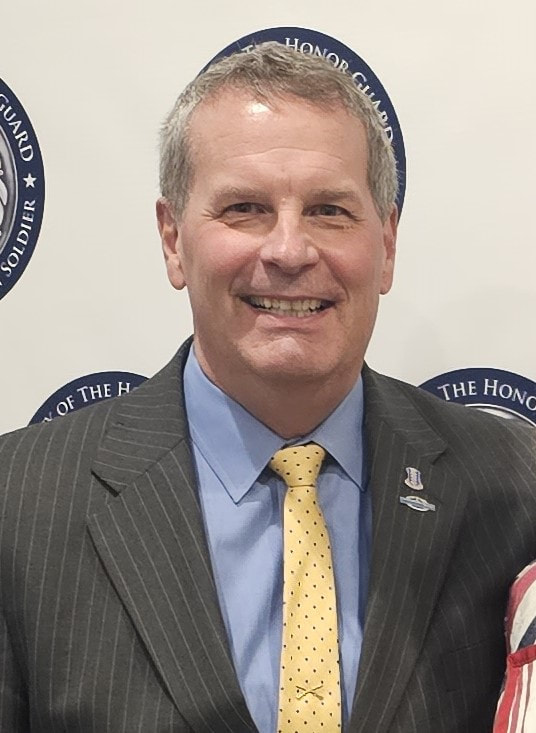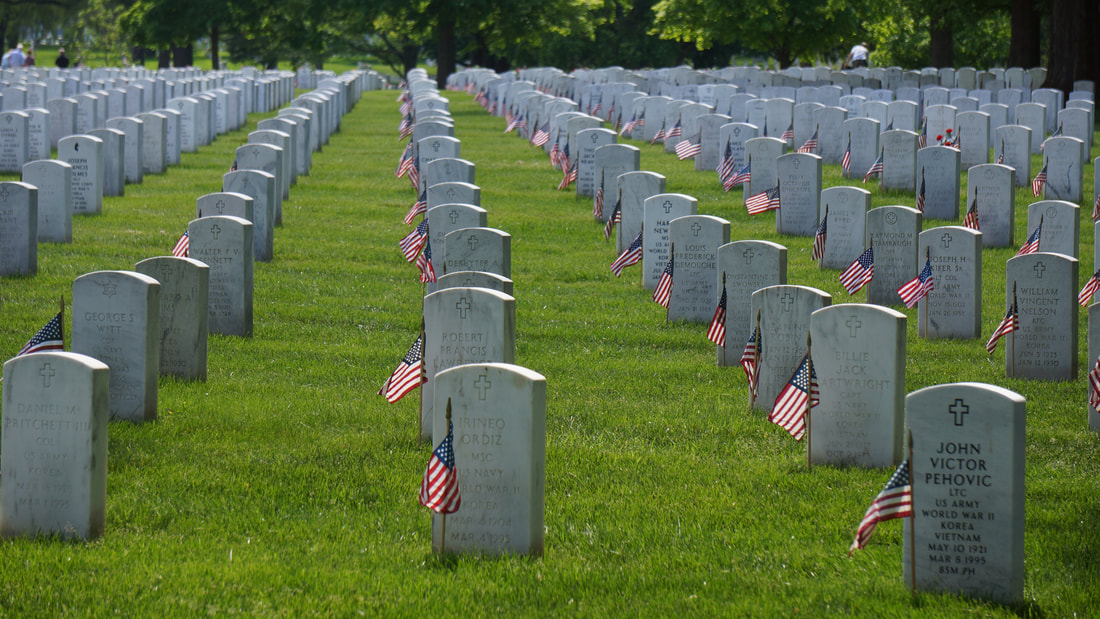|
Arlington National Cemetery Over Memorial Day Weekend -- Photo by Author It was a simple encounter. A young man--a soldier--accompanied by a young lady I feel certain was his wife who carried a child in her arms. We passed each other in 2005 in a hallway of the “old” Walter Reed Army Medical Center in Washington, DC. It was how he moved through that hallway that first caught my eye, but that was only part of the story.
The story of this young man, young woman, and young child is an important story for our nation. It's not just about them. They are representative of thousands of others. Like this small family is to me, each of them can easily become nameless and forgotten if we, as a nation, let them become so. If we, as a nation, don't care. If we, as a nation, are willing to betray them. I'm sure that each of those thousands of stories began in a similar way. There was someone who agreed to join the US Military. After enduring the rigors of their initial entry training, they joined a unit and went into harm's way. Then, there was some encounter, some violent action, that injured them. Most important to this particular story, the violence injured their brain. I don't know all the details of each story, but I think I know some of them. There's that dull headache that shows up in a theater of war and never seems to go away until after a few weeks back home. It's always uncomfortable and either too hot or too cold. There are incessant calls on the radio that need attention and demand a response that could endanger others. Sleep is never sufficient or uninterrupted. The TO DO list is never empty and frequently filled with several critical items that were not addressed yesterday. I'm sure their stories have elements like that. Then, one day, they were doing something that needed doing. Perhaps they were walking with their squad on some mission or driving in a convoy or flying in a helicopter or even just pausing somewhere. Suddenly, there was a flash and they were airborne or tumbling. There was certainly a deafening noise, but realization of that cacophony lags or doesn't matter as much as the other things their consciousness senses. While there are large objects--just like them--that are thrown around, small rocks, dirt, bits of glass and metal, and other items of unknown origin strike them everywhere, but generally sting the most on their face, lips, and eyes. Parts of what used to be their teammates also impact them and stick, making it harder when things settle down to determine the extent of their own injuries. Full self-awareness comes later. It could come to them where they landed after only a few moments, in a treatment facility somewhere after an hour or so, or several hours later, still with their unit and having rather unconsciously completed their mission without a true understanding of where they were or what they were doing. Most will tell you they are fine. After all, there are sometimes no broken bones and they aren't bleeding. Everyone on their team has some kind of small hurt; they are unwilling to dishonor and let down those closest to them who rely on their continued earnest efforts. Time passes and some of them come home. They are alive, but although they don't have mended bones or wounds that bled, they are injured and it dramatically impacts their lives and the lives of those around them. You may have seen someone who walks like the young man I saw at Walter Reed. Their steps aren't as long as you would expect from someone of their height. Their weight lands well forward on each step, almost on their toes; it looks like each of their steps lands just a little short, with the balls of their feet sliding forward for an inch or so along the ground before accepting all of their body weight. Their gate is shorter and a bit choppier than you would expect. If you look closely, you'll likely see their right arm straight and low, but not swinging back and forth in unison with their legs. Their hand is at almost knee level. The fingers are extended, ready to reach out to the wall to which they are close in case they are in need of something to steady them or just so they can slide their fingers along the wall so they have some independent confirmation that they aren't falling to the left or right. Although how they walk makes them bounce a bit, their gaze is routinely locked level and straight ahead. The countenance belies their commitment, but unless they are practiced in hiding their condition, their face makes clear that it requires extreme focus and most of their energy to simply keep moving forward upright and without assistance. That young man I saw in a hallway at Walter Reed Army Hospital in 2005 must have had a story with many similarities to those I list above. He was in his early twenties, about five feet and seven inches, with tightly cropped blonde hair, and a wiry build. His gait was more pronounced than I describe above; it was clear he was having trouble staying relatively vertical even in this level hallway, with polished and flat tiles under his feet, and a handrail he could grasp every inch of the way. He was, like all the others I've seen, laser-focused on his next few steps. He was committed to moving--on his own--to wherever was his next destination. The young woman, also blonde, who I believe was this soldier's wife, trailed him with an infant in her arms. She looked at this man ahead of her with love and admiration, but also with clear frustration. I'm sure this had to be the tenth, twentieth, or thirtieth appointment to which she'd gone, each time carrying her baby and trailing her husband at a frustratingly slow pace. She, too, looked committed, but she also showed a recognition that this was not what she'd envisioned when marrying this man and a further realization that their future did not look bright. This was but one of the many hallways in their future where her soldier husband would have to expend all his energy and place all of his focus just on moving forward independently. It was but one of the many hallways where she would have to choose between patience, love, and concern for her husband and what she would otherwise be able to accomplish were she not walking behind someone moving slowly and unsteadily. The faces of that young man, young woman, and young child are still fresh in my mind today. However, what remains clearest to me almost twenty years later is that--figuratively and literally--I walked right past them. Unfortunately, like the vast majority of my countrymen, I cast my gaze elsewhere. I left them behind. I've tried rationalizing over the years that what I had done wasn't a betrayal. Let’s face it, few people who have fought their nation's wars--been in combat--escape unscathed. I was no different and could come up with a list of conditions of my own on which I needed to focus. Additionally, I told myself that turning to walk with them might have embarrassed them or been unhelpful. For all I know, they might even have told me to leave them alone. I'll never know. I left them behind. I can’t recall when, but I made a promise to myself that I wouldn’t do that again. I hope you’ll join me in promising likewise. Today, The Day After Memorial Day 2023, each of us individually and our nation as a whole confronts a test. Over this past weekend, I hope we honored those who have made the ultimate sacrifice for their nation, recognized the sacrifices of their families, and ensured their families were cared for in the absence of their loved one(s). While that's positive, it's insufficient. Among us are those who are still living, but who carry heavy burdens most of us will thankfully never have to experience ourselves. We owe them more than thanking them for their service once or twice a year. We each owe them not ignoring them; we cannot leave them behind. Don't be someone who has to think back on your inaction and realize that you left behind some service member and his or her family. Do something tangible yourself or donate your time or money to one of the many charitable organizations that are working with far too few assets to ensure that none of those who served and sacrificed for our nation are ever forsaken or forgotten. Don’t walk past them. Don’t leave them behind.
1 Comment
Sarah Serdin
5/28/2024 16:12:20
Not fair. You always make me cry. Wish more people read these and commented - but I give them the benefit of the doubt that maybe they can't think of anything to say more profound that what they have just read.
Reply
Leave a Reply. |
AuthorI served 30 years in the Army, retiring as a colonel of infantry. I worked for several years after my Army career in the national security field. Now, I spend almost all my time in uncompensated positions in charitable or veterans organizations. Archives
May 2024
Categories |
Tomb of the Unknown Soldier Foundation
© Tomb of the Unknown Soldier Foundation. All rights reserved.



 RSS Feed
RSS Feed
